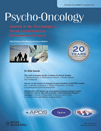Facilitating online support groups for cancer patients: the learning experience of psycho-oncology clinicians
Abstract
Objective: Counsellor familiarity and engagement with technology-mediated communication represents an important factor in the ability to implement support programs to cancer patients. This study describes the experiences of a cohort of expert psycho-oncology counsellors who learned to facilitate online support groups (OSGs) and identifies the important elements of their learning experience that led to their engagement.
Procedure and method: Six psycho-oncology counsellors were trained to facilitate OSGs and later facilitated OSGs in their own practice context. They subsequently reflected on and discussed their experiences with OSGs over time: in a panel discussion within 6 months of training, and in two focus groups. A participatory method was used to describe and interpret key elements of the learning process.
Results and discussion: Three themes of the counsellors' learning experience emerged: immersion in experiential learning, perceptions of clinical value and benefit, and overcoming challenges with adapted skills. Counsellors described components of their experiential learning: co-facilitating online cancer support groups with an expert, debriefing online, and participating in an online peer supervision group, as critical to their becoming engaged. Despite initial challenges, the counsellors learned new skills, and adapted known clinical skills, to the text-only environment.
Conclusion: With appropriate training and practice over time, counsellors familiar with delivering face-to-face support groups to cancer patients became skilled and engaged in leading OSG's for cancer patients. Learning to facilitate OSGs shifted practice by significantly expanding the scope of services they were able to provide their patients and has implications for expanding access to support services. Copyright © 2010 John Wiley & Sons, Ltd.




